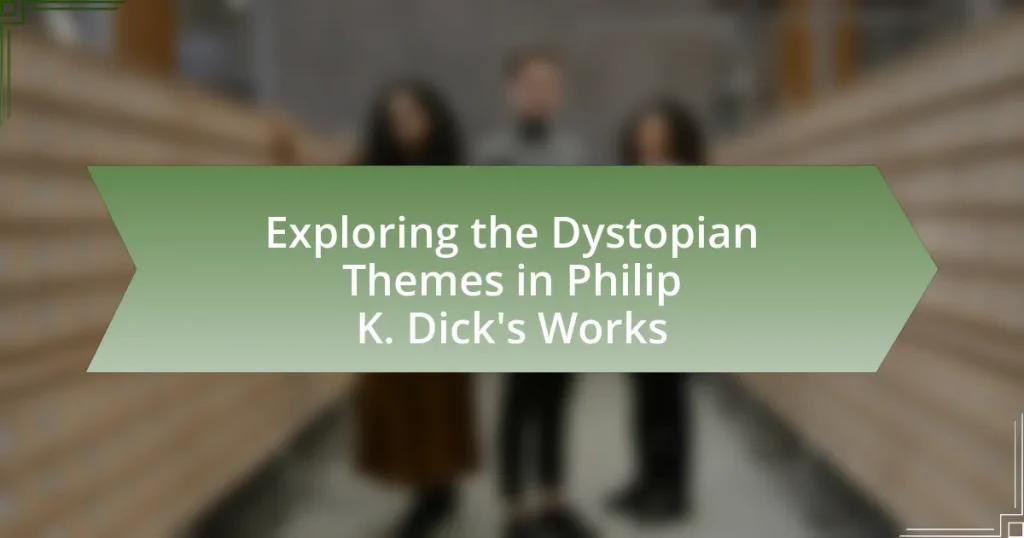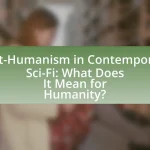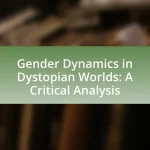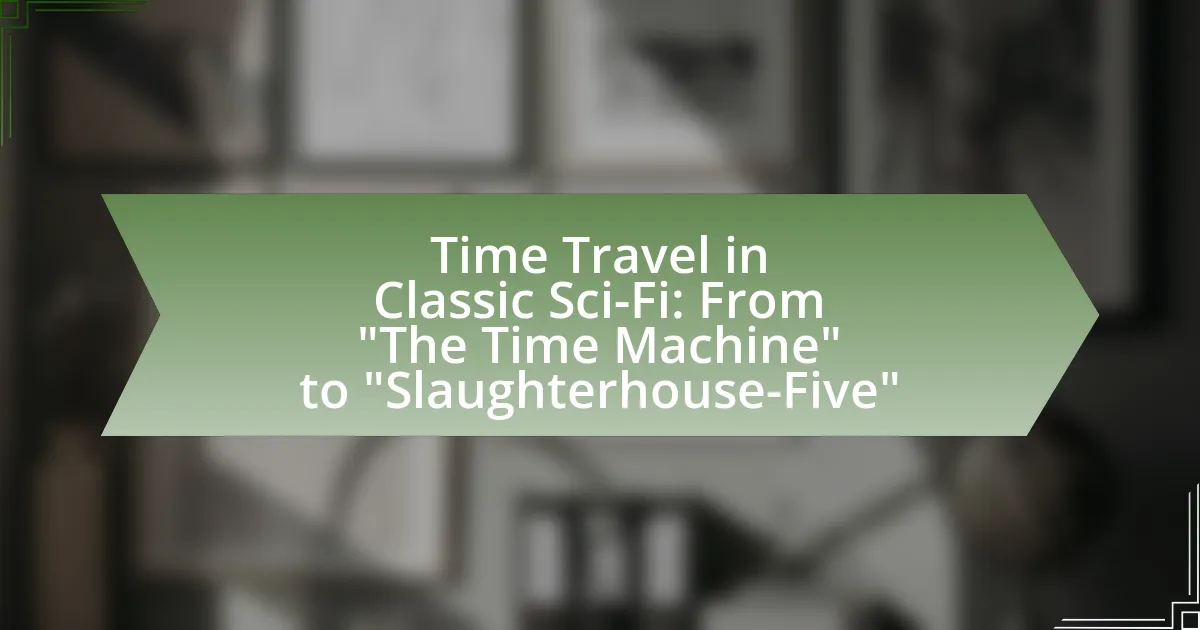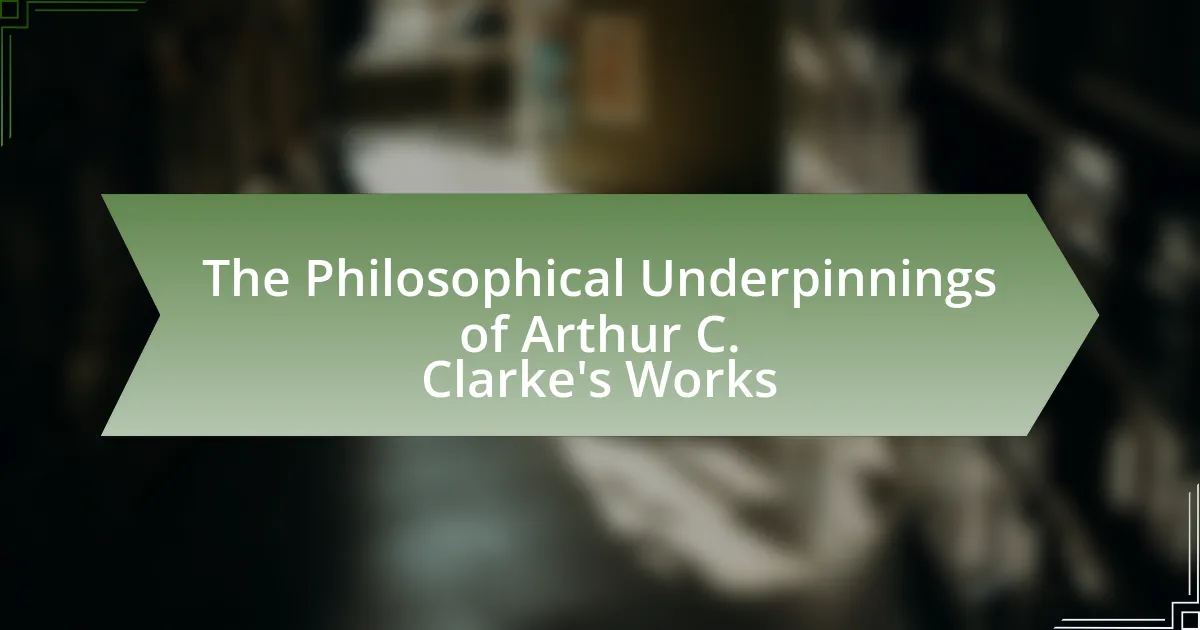Philip K. Dick is a prominent figure in dystopian literature, known for his exploration of themes such as reality, identity, and the impact of technology on society. His works, including “Do Androids Dream of Electric Sheep?”, “The Man in the High Castle,” and “A Scanner Darkly,” delve into the complexities of human perception, authoritarianism, and the ethical implications of technological advancements. The article examines how Dick’s narratives reflect societal concerns, the role of government and authority, and the psychological depth of his characters, while also highlighting his influence on modern dystopian literature and the relevance of his themes in contemporary society. Through a critical analysis of his unique narrative techniques and personal experiences, the article underscores the cautionary messages embedded in Dick’s dystopian worlds.
What are the Dystopian Themes in Philip K. Dick’s Works?
Philip K. Dick’s works prominently feature dystopian themes such as the nature of reality, identity, and the impact of technology on society. His narratives often explore the fragility of human perception, as seen in “Ubik,” where reality is manipulated, leading characters to question their existence. Additionally, themes of authoritarianism and surveillance are evident in “The Minority Report,” which critiques preemptive justice and the loss of free will. Dick’s portrayal of alienation and the search for authenticity in a mechanized world, particularly in “Do Androids Dream of Electric Sheep?” highlights the moral dilemmas faced in a technologically advanced society. These themes collectively reflect Dick’s concerns about the future of humanity in an increasingly controlled and artificial environment.
How do these themes reflect societal concerns?
The themes in Philip K. Dick’s works reflect societal concerns by illustrating the anxieties surrounding identity, reality, and authoritarianism. For instance, his exploration of altered states of consciousness and the nature of reality in “Ubik” highlights fears about technology’s impact on human perception and autonomy. Additionally, the pervasive surveillance and control depicted in “The Minority Report” resonate with contemporary concerns about privacy and state power, particularly in the context of increasing governmental surveillance practices. These narratives serve as cautionary tales, prompting readers to critically examine the implications of technological advancements and societal structures on individual freedoms and moral choices.
What specific societal issues does Dick address through dystopia?
Philip K. Dick addresses several specific societal issues through dystopia, including the nature of reality, identity, and the impact of technology on human relationships. His works often explore the consequences of authoritarianism and the loss of individuality, as seen in novels like “Do Androids Dream of Electric Sheep?” where the line between human and machine blurs, raising questions about empathy and what it means to be human. Additionally, Dick critiques consumerism and the commodification of life, evident in “A Scanner Darkly,” which illustrates the effects of drug addiction and surveillance on personal freedom and societal structure. These themes reflect Dick’s concerns about the dehumanizing aspects of modern society and the ethical implications of technological advancement.
How do characters in Dick’s works embody these societal concerns?
Characters in Philip K. Dick’s works embody societal concerns by reflecting themes of identity, reality, and the impact of technology on humanity. For instance, in “Do Androids Dream of Electric Sheep?”, the character Rick Deckard grapples with the moral implications of hunting androids, which raises questions about what it means to be human in a technologically advanced society. This struggle illustrates the anxiety surrounding artificial intelligence and its potential to blur the lines between human and machine. Additionally, in “The Man in the High Castle,” characters navigate an alternate reality shaped by totalitarianism, highlighting fears of authoritarianism and the loss of individual freedom. These portrayals serve as a critique of contemporary societal issues, such as the dehumanizing effects of consumerism and the fragility of personal identity in a rapidly changing world.
Why is Philip K. Dick considered a pioneer of dystopian literature?
Philip K. Dick is considered a pioneer of dystopian literature due to his innovative exploration of themes such as reality, identity, and authoritarianism. His works, including “Do Androids Dream of Electric Sheep?” and “The Man in the High Castle,” challenge perceptions of reality and question the nature of humanity in oppressive societies. Dick’s narratives often depict dystopian futures where technology and government control lead to existential crises, reflecting societal anxieties of his time, particularly during the Cold War. His ability to blend science fiction with philosophical inquiry has influenced countless authors and filmmakers, solidifying his status as a foundational figure in the genre.
What unique narrative techniques does Dick employ in his dystopian stories?
Philip K. Dick employs unique narrative techniques in his dystopian stories, including unreliable narrators, fragmented timelines, and the exploration of altered realities. Unreliable narrators create ambiguity, forcing readers to question the truth of the narrative, as seen in “Ubik,” where characters’ perceptions of reality are constantly challenged. Fragmented timelines disrupt linear storytelling, exemplified in “The Man in the High Castle,” where alternate histories intertwine, enhancing the complexity of the narrative. Additionally, Dick’s exploration of altered realities, particularly through themes of identity and consciousness, is evident in “Do Androids Dream of Electric Sheep?” where the distinction between human and artificial life blurs, prompting readers to reflect on the nature of existence. These techniques collectively deepen the thematic richness of his dystopian works.
How do Dick’s personal experiences influence his portrayal of dystopia?
Philip K. Dick’s personal experiences significantly influence his portrayal of dystopia by reflecting his struggles with identity, reality, and societal norms. His battles with mental health, including episodes of paranoia and hallucinations, inform the themes of altered realities and unreliable perceptions in his works, such as “Ubik” and “A Scanner Darkly.” Additionally, Dick’s experiences with drug use and the counterculture of the 1960s shape his exploration of dystopian societies that manipulate consciousness and control individuals. His own feelings of alienation and disconnection from mainstream society are evident in the characters he creates, who often grapple with existential crises in oppressive environments. These elements demonstrate how Dick’s life experiences serve as a foundation for the complex, often bleak worlds he constructs in his narratives.
What are the key characteristics of Dick’s dystopian worlds?
Philip K. Dick’s dystopian worlds are characterized by themes of reality manipulation, authoritarian control, and existential uncertainty. In his narratives, characters often grapple with altered perceptions of reality, as seen in “Ubik,” where the nature of existence is questioned through the manipulation of time and consciousness. Authoritarian control is prevalent, exemplified in “The Man in the High Castle,” where totalitarian regimes dictate societal norms and individual freedoms. Additionally, existential uncertainty permeates his works, as characters frequently confront the ambiguity of their identities and the nature of their experiences, illustrated in “Do Androids Dream of Electric Sheep?” where the line between human and artificial life blurs. These characteristics collectively create a complex exploration of human experience in oppressive and surreal environments.
How does technology shape the dystopian settings in his works?
Technology in Philip K. Dick’s works shapes dystopian settings by creating environments where human experience is manipulated and controlled. In novels like “Do Androids Dream of Electric Sheep?” and “Ubik,” advanced technologies blur the lines between reality and illusion, leading to existential crises among characters. For instance, the presence of androids raises questions about identity and humanity, while the use of pervasive surveillance and corporate control illustrates the loss of individual autonomy. These elements reflect Dick’s critique of technological advancement, emphasizing its potential to dehumanize society and foster paranoia.
What role do government and authority play in Dick’s dystopian narratives?
In Philip K. Dick’s dystopian narratives, government and authority often serve as oppressive forces that manipulate reality and control individual lives. These entities are depicted as corrupt, invasive, and often dehumanizing, reflecting Dick’s critique of totalitarianism and bureaucratic systems. For instance, in “The Man in the High Castle,” the alternate history showcases a world where authoritarian regimes dominate, illustrating the loss of personal freedom and the pervasive influence of state power. Similarly, in “Do Androids Dream of Electric Sheep?”, the government enforces strict regulations on androids, highlighting themes of identity and humanity under authoritarian scrutiny. Dick’s portrayal of government and authority underscores the dangers of unchecked power and the impact of societal structures on personal autonomy.
How do Dick’s dystopian themes compare to other authors?
Philip K. Dick’s dystopian themes often emphasize the fragility of reality and the nature of consciousness, setting him apart from other authors in the genre. While many dystopian writers, such as George Orwell and Aldous Huxley, focus on totalitarianism and societal control, Dick explores the psychological implications of living in a manipulated reality, as seen in works like “Ubik” and “Do Androids Dream of Electric Sheep?” His narratives frequently question the authenticity of human experience and identity, contrasting with Orwell’s and Huxley’s more straightforward critiques of political systems. This unique focus on subjective reality and existential uncertainty positions Dick’s work as a profound exploration of the human condition within dystopian frameworks.
What similarities and differences exist between Dick and other dystopian writers?
Philip K. Dick shares similarities with other dystopian writers in his exploration of themes such as reality, identity, and authoritarianism, yet he differs in his focus on subjective experience and psychological depth. Like George Orwell and Aldous Huxley, Dick critiques societal structures and the potential for oppressive regimes; however, his narratives often delve into the fragmented nature of reality and the malleability of human perception, as seen in works like “Ubik” and “A Scanner Darkly.” This emphasis on the individual’s internal struggle contrasts with the more overt political critiques found in Orwell’s “1984” or Huxley’s “Brave New World,” where the societal context is more pronounced and the consequences of dystopia are depicted through external control rather than internal conflict.
How has Dick’s influence shaped modern dystopian literature?
Philip K. Dick’s influence has profoundly shaped modern dystopian literature by introducing complex themes of reality, identity, and authoritarianism. His works, such as “Do Androids Dream of Electric Sheep?” and “The Man in the High Castle,” explore the blurred lines between human and machine, as well as the implications of totalitarian regimes, which have become central motifs in contemporary dystopian narratives. Dick’s emphasis on psychological depth and existential questions has inspired authors like Margaret Atwood and Neil Gaiman, who incorporate similar themes of surveillance, societal control, and the nature of consciousness in their own dystopian settings. His unique approach to speculative fiction has established a framework that challenges readers to question the nature of reality and the ethical implications of technological advancement, thus leaving a lasting legacy on the genre.
What are the implications of Dick’s dystopian themes for contemporary society?
Dick’s dystopian themes highlight the dangers of authoritarianism, technological overreach, and the fragility of reality, which resonate strongly in contemporary society. These themes serve as a cautionary reflection on current issues such as surveillance, loss of individuality, and the ethical implications of artificial intelligence. For instance, the rise of surveillance technologies parallels Dick’s portrayal of oppressive regimes, emphasizing the need for vigilance against privacy erosion. Additionally, the exploration of identity and reality in his works prompts critical discussions about the impact of social media and virtual realities on human perception and relationships. This relevance underscores the importance of addressing these themes to navigate the complexities of modern life effectively.
How can readers apply lessons from Dick’s works to current societal issues?
Readers can apply lessons from Philip K. Dick’s works to current societal issues by recognizing the themes of identity, reality, and authoritarianism present in his narratives. For instance, Dick’s exploration of altered realities in “Ubik” and “The Man in the High Castle” prompts readers to critically evaluate the nature of truth and perception in today’s media-saturated environment, where misinformation can distort public understanding. Additionally, his critiques of oppressive systems in “Do Androids Dream of Electric Sheep?” highlight the ethical implications of technology and surveillance, urging readers to consider the balance between innovation and individual rights in contemporary society. These lessons encourage active engagement with current events and foster a deeper understanding of the complexities surrounding personal autonomy and societal control.
What warnings does Dick provide about the future through his dystopian narratives?
Philip K. Dick warns about the dangers of unchecked technological advancement and the erosion of individual identity in his dystopian narratives. His works often depict futures where technology dehumanizes society, as seen in “Do Androids Dream of Electric Sheep?” where artificial beings challenge the essence of humanity. Additionally, Dick explores themes of government surveillance and control, exemplified in “The Minority Report,” which illustrates the potential for a totalitarian state to manipulate free will. These narratives serve as cautionary tales about the consequences of losing personal autonomy and the moral implications of technological progress.
What are the most notable works of Philip K. Dick that explore dystopian themes?
Philip K. Dick’s most notable works that explore dystopian themes include “Do Androids Dream of Electric Sheep?”, “The Man in the High Castle”, and “A Scanner Darkly”. “Do Androids Dream of Electric Sheep?” presents a post-apocalyptic world where the line between humans and androids blurs, reflecting on the nature of humanity and empathy. “The Man in the High Castle” depicts an alternate history where the Axis powers won World War II, exploring themes of totalitarianism and reality. “A Scanner Darkly” examines drug addiction and surveillance in a near-future society, highlighting the loss of identity and autonomy. These works are significant for their critical examination of societal issues and the human condition within dystopian settings.
Which stories best exemplify his approach to dystopia?
Philip K. Dick’s stories that best exemplify his approach to dystopia include “Do Androids Dream of Electric Sheep?”, “The Man in the High Castle,” and “A Scanner Darkly.” “Do Androids Dream of Electric Sheep?” explores themes of identity and humanity in a post-apocalyptic world where androids challenge the notion of what it means to be human. “The Man in the High Castle” presents an alternate history where the Axis powers won World War II, examining the implications of totalitarianism and cultural hegemony. “A Scanner Darkly” delves into the effects of drug addiction and surveillance on personal identity and reality. These narratives reflect Dick’s critical perspective on society, technology, and the human condition, showcasing his unique dystopian vision.
What critical reception have these works received over time?
Philip K. Dick’s works have received a varied critical reception over time, evolving from initial skepticism to widespread acclaim. Early reviews often dismissed his novels as mere science fiction, with critics focusing on their unconventional narratives and philosophical themes. However, as literary analysis deepened, scholars began to recognize the complexity of his dystopian visions, particularly in works like “Do Androids Dream of Electric Sheep?” and “The Man in the High Castle.” These texts have been praised for their exploration of identity, reality, and authoritarianism, leading to their inclusion in academic discourse and literary canon. The 21st century has seen a resurgence of interest, with adaptations of his works into films and television series further solidifying his status as a significant figure in both science fiction and literature.
How can readers engage with Philip K. Dick’s dystopian themes today?
Readers can engage with Philip K. Dick’s dystopian themes today by exploring his novels and short stories, which often reflect contemporary societal issues such as surveillance, identity, and reality. For instance, works like “Do Androids Dream of Electric Sheep?” and “The Man in the High Castle” provide critical commentary on technology’s impact on humanity and the nature of authoritarianism. Additionally, readers can participate in discussions and analyses through online forums, book clubs, and academic courses that focus on Dick’s influence on modern science fiction and its relevance to current events, such as the rise of artificial intelligence and government overreach. This engagement not only deepens understanding of Dick’s themes but also encourages reflection on their implications in today’s world.
